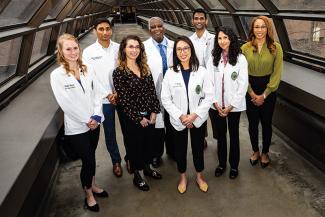The students’ research ranges from examining the history of legislation around sugary drinks to a program that used text alerts to remind community members to take blood pressure medications. A collection of the research was recently published in Cardiac Disparities Special Edition in American Heart Journal Open.
“Simply waiting for the intermittent physician office visit will not address the poor levels of hypertension control seen in racial and ethnic minority populations,” Ferdinand said. “A just society will not allow these health inequities to persist, and we need to have everyone work together, not only physicians, but also advanced practice nurses, public health officials, medical students, community members, and patients working as integrated team-based approach.”
Third-year medical student Tina Reddy said that her work in the field with Ferdinand only enhanced the “cultural humility” training she’s received while studying at the medical school.
“Dr. Ferdinand mentors so many of us students and gives us the opportunity to see what’s going on in our communities firsthand. We have to really understand the barriers patients face and the social factors that affect their day-to-day life.”































































